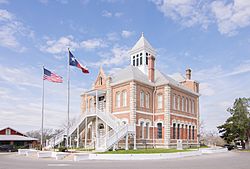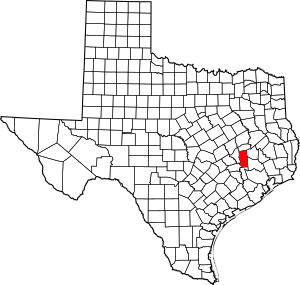Grimes County, Texas facts for kids
Quick facts for kids
Grimes County
|
|
|---|---|

The Grimes County Courthouse in Anderson
|
|

Location within the U.S. state of Texas
|
|
 Texas's location within the U.S. |
|
| Country | |
| State | |
| Founded | 1846 |
| Named for | Jesse Grimes |
| Seat | Anderson |
| Largest city | Navasota |
| Area | |
| • Total | 802 sq mi (2,080 km2) |
| • Land | 787 sq mi (2,040 km2) |
| • Water | 14 sq mi (40 km2) 1.8% |
| Population
(2020)
|
|
| • Total | 29,268 |
| • Density | 36.494/sq mi (14.090/km2) |
| Time zone | UTC−6 (Central) |
| • Summer (DST) | UTC−5 (CDT) |
| Congressional district | 10th |
Grimes County is a county located in southeastern Texas, United States. In 2020, about 29,268 people lived there. The main town, or seat, is Anderson.
Grimes County was created in 1846 from Montgomery County. It is named after Jesse Grimes, who signed the Texas Declaration of Independence. He was also one of the first European-American settlers in the area.
The Navasota and Brazos Rivers form the western border of the county. Water from the eastern parts of the county flows into the San Jacinto River.
Contents
History of Grimes County
Long ago, French and Spanish explorers met the Bidai Indians in this area. The Bidai people were mentioned in Spanish records as early as 1691. Like many other Native American tribes, they faced new diseases from the Europeans. Many people died, and the survivors often joined other tribes.
During the time of Spanish rule, very few Europeans settled here. But after Mexico became independent, it invited settlers from the United States to come to eastern Texas. These settlers could practice their own religion, as long as they were loyal to the Mexican government.
Some old buildings in Anderson, like the Fanthorp Inn, are from this time. Others are from when Texas was an independent republic or when it first joined the United States. Because of these historic buildings, Anderson and the nearby area are called the "Anderson Historic District." This district is listed on the National Register of Historic Places.
Settlers from the United States, mostly from the South, began moving to what is now Grimes County in the 1820s. At that time, it was part of Mexico. Many of these early settlers brought enslaved African Americans with them to work on farms. The first machine for cleaning cotton, called a cotton gin, was built by Jared E. Groce. He arrived with 90 enslaved people and started a large cotton farm near where Hempstead, Texas is today.
Texas became independent in 1836. After this, even more settlers came from the United States. The rich, flat lands were first used for growing cotton, especially before the American Civil War.
Grimes County was officially set up in 1846. This was one year after the Republic of Texas joined the United States. From 1850 until the Civil War, the number of white people in the county grew steadily. The number of enslaved African Americans grew even faster, as new settlers continued to bring them. Farmers kept growing cotton and corn to sell. By 1860, there were 4,852 white people and 5,468 enslaved people in the county. This meant enslaved people made up 53% of the population.
After the Civil War, enslaved people were freed. This was a big change, and white people found it hard to adjust to a system where workers were free. There were many conflicts and challenges as people adjusted to new ways of life. Federal soldiers were sent to the area, and the Freedman's Bureau, an agency that helped newly freed people, opened an office. This agency also helped start schools for African Americans in the county.
In the late 1800s, some white Democrats formed a group called the White Man's Union. This secret group used violence to take control of elections in 1900. They killed several Black leaders of the Populist Party. This group chose all the county officials until 1958.
The economy of the county became weaker in the late 1800s, which made social problems worse.
In 1859, a railroad line was built into the county. Anderson, the county seat, did not want the railroad to come through its town. So, the railroad went to Navasota instead. Navasota soon became bigger than Anderson. Anderson finally got a railroad in the early 1900s, but it never became as large as Navasota. Later, the Burlington Northern Santa Fe and the Union Pacific became the main railroads in the county.
Because of the violence and the White Man's Union, many African Americans started to leave Grimes County. The county's population dropped a lot from 1900 to 1920, and again from 1930 to 1980. This was part of the Great Migration. During this time, African Americans left Texas and other Southern states. They wanted to escape unfair laws and practices, like Jim Crow laws and being prevented from voting. They also looked for better jobs. After 1940, many moved to the West Coast for jobs in factories that made things for the military. White people from rural areas also left the South for industrial cities.
Grimes County mostly remained a rural, farming area until the late 1900s. This was a reason why its population kept shrinking. In the early 1900s, cutting and processing timber was an important industry. Later in the 20th century, raising livestock and dairy farming became more important. These made up 93% of the county's farm income. Also, farmers started growing more different kinds of crops.
In the 21st century, State Highway 90 is the main road going north and south. State Highways 30 and 105 run east and west. With some new factories, the population started to grow again in the late 1970s. In 2014, about 27,172 people lived in Grimes County. About 59.5% were white, 22.6% were Hispanic, and 16.5% were African American.
Geography
The U.S. Census Bureau says that Grimes County covers a total area of 802 square miles. About 14 square miles (1.8%) of this area is covered by water.
Major Highways
 State Highway 6
State Highway 6 State Highway 30
State Highway 30 State Highway 90
State Highway 90 State Highway 105
State Highway 105 State Highway 249 (also known as Aggie Expressway)
State Highway 249 (also known as Aggie Expressway)
Neighboring Counties
- Madison County (north)
- Walker County (northeast)
- Montgomery County (southeast)
- Waller County (south)
- Washington County (southwest)
- Brazos County (west)
Population Information
| Historical population | |||
|---|---|---|---|
| Census | Pop. | %± | |
| 1850 | 4,008 | — | |
| 1860 | 10,307 | 157.2% | |
| 1870 | 13,218 | 28.2% | |
| 1880 | 18,603 | 40.7% | |
| 1890 | 21,312 | 14.6% | |
| 1900 | 26,106 | 22.5% | |
| 1910 | 21,205 | −18.8% | |
| 1920 | 23,101 | 8.9% | |
| 1930 | 22,642 | −2.0% | |
| 1940 | 21,960 | −3.0% | |
| 1950 | 15,135 | −31.1% | |
| 1960 | 12,709 | −16.0% | |
| 1970 | 11,855 | −6.7% | |
| 1980 | 13,580 | 14.6% | |
| 1990 | 18,828 | 38.6% | |
| 2000 | 23,552 | 25.1% | |
| 2010 | 26,604 | 13.0% | |
| 2020 | 29,268 | 10.0% | |
| U.S. Decennial Census 1850–2010 2010 2020 |
|||
| Race / Ethnicity (NH = Not Hispanic) | Pop 2000 | Pop 2010 | Pop 2020 | % 2000 | % 2010 | % 2020 |
|---|---|---|---|---|---|---|
| White alone (NH) | 14,772 | 16,133 | 16,910 | 62.72% | 60.64% | 57.78% |
| Black or African American alone (NH) | 4,667 | 4,348 | 3,824 | 19.82% | 16.34% | 13.07% |
| Native American or Alaska Native alone (NH) | 50 | 82 | 85 | 0.21% | 0.31% | 0.29% |
| Asian alone (NH) | 61 | 61 | 102 | 0.26% | 0.23% | 0.35% |
| Pacific Islander alone (NH) | 10 | 7 | 8 | 0.04% | 0.03% | 0.03% |
| Other race alone (NH) | 8 | 16 | 84 | 0.03% | 0.06% | 0.29% |
| Mixed race or Multiracial (NH) | 197 | 305 | 894 | 0.84% | 1.15% | 3.05% |
| Hispanic or Latino (any race) | 3,787 | 5,652 | 7,361 | 16.08% | 21.24% | 25.15% |
| Total | 23,552 | 26,604 | 29,268 | 100.00% | 100.00% | 100.00% |
In 2000, there were 23,552 people living in the county. The population density was about 30 people per square mile. Most people in the county were Christian.
Communities
Cities
- Anderson (county seat)
- Bedias
- Iola
- Navasota
- Plantersville
- Todd Mission
Census-Designated Places
Other Communities
- Apolonia
- Roans Prairie
- Stoneham
- White Hall
Education
Here are the school districts in Grimes County:
- Anderson-Shiro Consolidated Independent School District
- Iola Independent School District
- Madisonville Consolidated Independent School District
- Navasota Independent School District
- Richards Independent School District
Blinn College is the community college for all of Grimes County.
Notable Residents
- Actor Chuck Norris lives near Navasota, which is the largest city in the county. He and his wife opened a bottled-water company there. Chuck Norris starred in the TV show Walker, Texas Ranger.
See also
 In Spanish: Condado de Grimes para niños
In Spanish: Condado de Grimes para niños
 | Janet Taylor Pickett |
 | Synthia Saint James |
 | Howardena Pindell |
 | Faith Ringgold |

